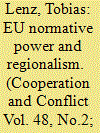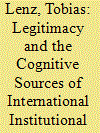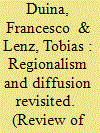|
|
|
Sort Order |
|
|
|
Items / Page
|
|
|
|
|
|
|
| Srl | Item |
| 1 |
ID:
120737


|
|
|
|
|
| Publication |
2013.
|
| Summary/Abstract |
The ideational impact captured by Manners's notion of normative power Europe (NPE) appears most distinct and potentially most consequential in the realm of regionalism. However, empirical research on the topic has been hampered by the focus on EU actorness and methodological difficulties. Drawing on diffusion theory, this article develops conceptual, theoretical and methodological foundations for conceiving NPE as ideational diffusion. It argues that Europe's ideational influence on regionalism can be fruitfully understood as the largely indirect process by which the EU experience travels to other regions through socialization and emulation. Yet, as structural conditions vary across regions, EU ideational diffusion rarely leads to similar or even comparable institutional practices and outcomes. A choice-orientated approach is proposed for examining these claims empirically, which focuses on specifying the underlying counterfactual: political decisions in regionalism would have been different in the absence of the EU. The article concludes by outlining the analytical and normative promise of the proposed recasting of Manners's original concept.
|
|
|
|
|
|
|
|
|
|
|
|
|
|
|
|
| 2 |
ID:
157611


|
|
|
|
|
| Summary/Abstract |
Why are some institutional designs perceived as more legitimate than others, and why is the same institutional design sometimes perceived as legitimacy-enhancing in one setting and not in another? In a world in which most international organisations (IOs) do not fully embody societal values and norms, such as democratic participation and equal treatment, why do legitimacy deficits in some organisations lead to pressure for institutional change while in others they are tolerated? These are important questions given that many analysts have diagnosed a ‘legitimacy crisis’ of IOs, but we argue that existing approaches are ill equipped to answer them. We show that the existing legitimacy literature has an implicit model of institutional change – the congruence model – but that this model has difficulty accounting for important patterns of change and non-change because it lacks microfoundations. We argue that attributions of legitimacy rest on perceptions and this implies the need to investigate the cognitive bases of legitimacy. We introduce a cognitive model of legitimacy and deduce a set of testable propositions to explain the conditions under which legitimacy judgments change and, in turn, produce pressures for institutional change in IOs.
|
|
|
|
|
|
|
|
|
|
|
|
|
|
|
|
| 3 |
ID:
170027


|
|
|
|
|
| Summary/Abstract |
How and under what conditions does legitimacy affect processes of international institutional change? This article specifies and evaluates three causal mechanisms by which variation in legitimacy induces institutional change in international organizations (IOs) and argues that an important, yet hitherto neglected, source of legitimacy-based change is cognitive in nature. Using survival analysis, we evaluate these mechanisms with a novel dataset on the establishment of parliamentary institutions in thirty-six regional organizations between 1950 and 2010. We find that the empowerment of supranational secretariats, engagement with the European Union, and parliamentarization in an organization's neighborhood increase the likelihood of regional parliamentarization. This suggests that legitimacy judgments that draw on cognitive referents provide an important source of international institutional change. We illustrate the underlying cognitive emulation mechanism with a case study of parliamentarization in the Association of Southeast Asian Nations.
|
|
|
|
|
|
|
|
|
|
|
|
|
|
|
|
| 4 |
ID:
148133


|
|
|
|
|
| Summary/Abstract |
An emerging research programme on diffusion across regional international organisations (RIOs) proposes that decisions taken in one RIO affect decision-making in other RIOs. This work has provided a welcome corrective to endogenously-focused accounts of RIOs. Nevertheless, by focusing on the final design of policies and institutional arrangements, it has been conceptually overly narrow. This has led to a truncated understanding of diffusion’s impact and to an unjustified view of convergence as its primary outcome. Drawing on public policy and sociological research, we offer a conceptual framework that seeks to remedy these weaknesses by disaggregating the decision-making process on the ‘receiving’ side. We suggest that policies and institutional arrangements in RIOs result from three decision-making stages: problematisation (identification of something as a political problem), framing (categorisation of the problem and possible solutions), and scripting (design of final solutions). Diffusion can affect any combination of these stages. Consequently, its effects are more varied and potentially extensive than is currently recognised, and convergence and persistent variation in scripting are both possible outcomes. We illustrate our framework by re-evaluating research on dispute settlement institutions in the EEC, NAFTA, and SADC. We conclude by discussing its theoretical implications and the conditions that likely promote diffusion.
|
|
|
|
|
|
|
|
|
|
|
|
|
|
|
|
|
|
|
|
|